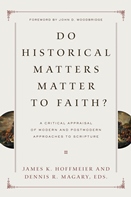About the Editors
James K. Hoffmeier (PhD, University of Toronto) is professor of Old Testament and ancient Near Eastern history and archaeology at Trinity Evangelical Divinity School.
Dennis R. Magary (PhD, University of Wisconsin-Madison) is chair of the department and associate professor of Old Testament and Semitic languages at Trinity Evangelical Divinity School.
Overview
It is old news that liberal critical scholars reject the doctrine of biblical inerrancy. What is new is the number of evangelical scholars who are following the same type of arguments and arriving at similar conclusions, but still identifying themselves as evangelical. This book consists of scholarly essays written by specialists who affirm the complete reliability and inerrancy of Scripture. The essays are grouped together in four major parts. Part one deals with matters of biblical, systematic, and historical theology. Parts two and three are concerned with issues of history, authenticity, and authority in the Old and New Testaments respectively. The fourth part looks at the Old Testament and archaeology. The overall force of the book is that careful scholarly work in diverse fields dovetails together to support the doctrine of the inerrancy of Scripture.
Table of Contents
Preface
1 Religious Epistemology, Theological Interpretation of Scripture, and Critical Biblical Scholarship: A Theologian’s Reflection
Thomas H. McCall
2 The Peril of a “Historyless” Systematic Theology
Graham A. Cole
3 The Divine Investment of Truth: Toward a Theological Account of Biblical Inerrancy
Mark D. Thompson
4 “These Things Happened”: Why a Historical Exodus is Essential for Theology
James K. Hoffmeier
5 Fundamentum et Columnam Fidei Nostrae: Irenaeus on the Perfect and Saving Nature of the Scriptures
Michael A.G. Haykin
6 Pentateuchal Criticism and the Priestly Torah
Richard E. Averbeck
7 Old Testament Source Criticism: Some Methodological Miscues
Robert B. Chisolm Jr.
8 Word Distribution as an Indicator of Authorial Intention: A Study of Genesis 1:1-2:3
Robert D. Bergen
9 The Culture of Prophecy and Writing in the Ancient Near East
John W. Hilber
10 Isaiah, Isaiahs, and Current Scholarship
Richard L. Schultz
11 Daniel in Babylon: An Accurate Record?
Alan R. Millard
12 A Critical-Realistic Reading of the Psalm Titles: Authenticity, Inspiration, and Evangelicals
Willem A. Vangemeran and Jason Stanghelle
13 The Old Testament as Cultural Memory
Jens Bruun Kofoed
14 God’s Word in Human Words: Form-Critical Reflections
Robert W. Yarbrough
15 A Constructive Traditional Response to New Testament Criticism
Craig L. Blomberg
16 Precision and Accuracy: Making Distinctions in the Cultural Context That Give Us Pause in Pitting the Gospels against Each Other
Darrell L. Bock
17 Paul, Timothy, and Titus: The Assumption of a Pseudonymous Author and of Pseudonymous Recipients in the Light of Literary, Theological, and Historical Evidence
Eckhard J. Schnabel
18 Saint Paul on Cyprus: The Transformation of an Apostle
Thomas W. Davis
Chapter 19 Enter Joshua: The “Mother of Current Debates” in Biblical Archaeology
John M. Monson
20 Yahweh’s “Wife” and Belief in One God in the Old Testament
Richard S. Hess
21 New Excavations at Khirbet Qeiyafa and the Early History of Judah
Michael G. Hasel
22 The Archaeology of David and Solomon: Method or Madness?
Steven M. Ortiz
General Index
Scripture Index
Summary
Chapter 1. Religious Epistemology, Theological Interpretation of Scripture, and Critical Biblical Scholarship: A Theologian’s Reflection
Thomas H. McCall
Critical biblical scholarship (CBS) has long challenged the historical reliability of the Scriptures. Do Christians need to accept the conclusions of CBS and reject strict inerrancy in order to remain intellectually justified in their belief?
One relevant component of this discussion that is often overlooked is …
[To continue reading this summary, please see below....]The remainder of this article is premium content. Become a member to continue reading.
Already have an account? Sign In
